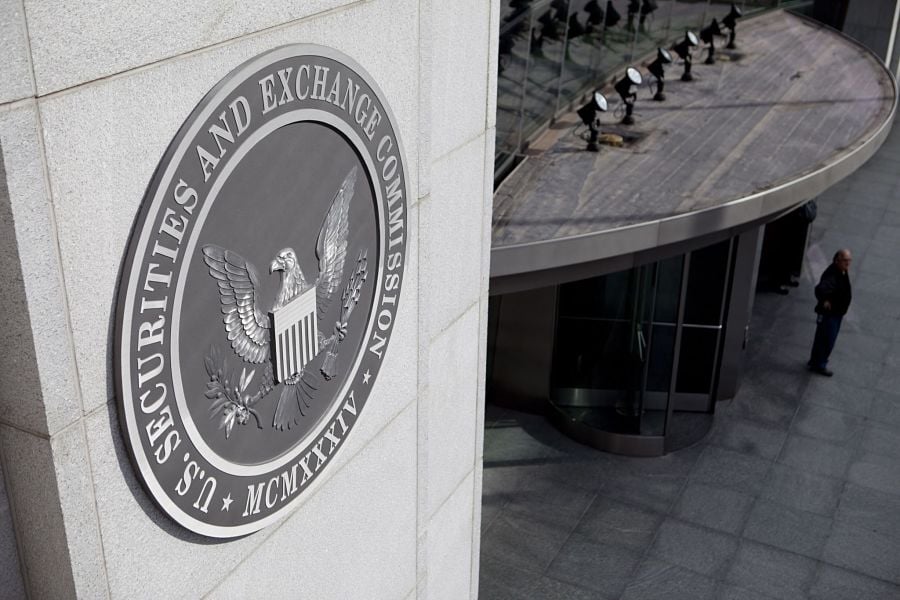

The SEC voted Wednesday to expand the scope of a rule meant to ensure investment funds’ portfolios match the strategies suggested by their names, but the changes aren’t as restrictive about the use of environmental, social and governance factors as those the agency initially proposed.
The Securities and Exchange Commission approved, 4-1, amendments to the so-called fund names rule that requires funds to invest 80% of their assets in alignment with the fund’s focus as conveyed by its label. The current rule covers investment types, industries and geographies.
The changes adopted by the SEC would widen the names rule to apply to more funds and encompass names purporting to include investments with certain characteristics, such as “growth,” or “value,” or certain investment themes, such as ESG, according to an SEC fact sheet.
“I think of it as truth in advertising,” SEC Chair Gary Gensler said at an open meeting. “In essence, if a fund’s name suggests an investment focus, the fund in turn needs to invest shareholders’ dollars in a manner consistent with that investment focus. Otherwise, a fund’s portfolio might be inconsistent with what fund investors desired when selecting a fund based upon its name.”
The goal of the rule is to help investors better sort out the thousands of funds on the market.
“It’s intended to make it easier for all shareholders easily to understand what they’re investing in,” said Abigail Hemnes, partner at the law firm K&L Gates.
Under the final rule the SEC approved Wednesday, investment companies would have the latitude to define the terms they use in a fund name and their criteria for selecting investments to align with the terms. Those terms would have to be consistent with their plain-English meaning or industry use.
Funds would have to review their portfolios quarterly to confirm compliance with the 80% rule. They would have 90 days to get back into compliance if their investment allocations don’t hit the 80% threshold required to coincide with their names. The original proposal had a 30-day grace period.
The final rule in part combats so-called “greenwashing,” in which funds hold themselves out as having an ESG focus, but don’t invest that way. Under the rule, if a fund name says it’s “sustainable,” “green” or “socially responsible,” its investments should reflect that approach.
The final rule, however, excised a provision that would have prohibited funds from using ESG in their names if ESG factors are considered along with other investment selection criteria, rather than being the decisive variable. Gensler said the commission would take up that issue separately. It may be included in other pending ESG proposals.
“That did strip out that separate component that would have been more onerous,” Hemnes said. “ESG does not have to be a determinative factor. But [funds] do have to define ESG terms and include criteria in their disclosures” about using them.
Funds’ latitude to choose their names was one reason SEC commissioner Hester Peirce voted in favor of the final rule. Peirce, a Republican appointment to the five-member SEC, has often been on the dissenting side of SEC votes along with her fellow GOP commissioner Mark Uyeda.
The flexibility fund managers have in interpreting terms means investors must look beyond a fund name to assess whether they should buy shares, Peirce said. She drew an analogy to walking into a pizzeria.
“You’re not going to get sushi or tacos, you’re going to get some sort of pizza,” Peirce said during the SEC meeting. “To get precisely what I want, I have to read the menu to figure out if this is the pizza shop for me.”
Uyeda was the lone dissenting vote. Funds could turn to generic monikers to avoid running afoul of the rule, and “fund innovation and investor choice will suffer," Uyeda said.
The SEC’s action Wednesday was the first reform of the names rule since it was originally adopted in 2001. The primary trade association for mutual funds, the Investment Company Institute, opposed it.
“The rule sweeps more than three-quarters of all the funds in the U.S. into its dragnet, going far beyond ESG funds — the supposed root of the rulemaking — with no justification,” ICI CEO Eric Pan said in a statement. “The agency has also failed to take a reasoned and calibrated approach to improving fund disclosure, as they should have before making sweeping changes to rules surrounding fund names.”
The amendments to the names rule become effective 60 days after they’re published in the Federal Register. Funds with net assets of $1 billion or more have 24 months to comply. Funds with assets of less than $1 billion have 30 months.

Relationships are key to our business but advisors are often slow to engage in specific activities designed to foster them.

Whichever path you go down, act now while you're still in control.

Pro-bitcoin professionals, however, say the cryptocurrency has ushered in change.

“LPL has evolved significantly over the last decade and still wants to scale up,” says one industry executive.

Survey findings from the Nationwide Retirement Institute offers pearls of planning wisdom from 60- to 65-year-olds, as well as insights into concerns.
Streamline your outreach with Aidentified's AI-driven solutions
This season’s market volatility: Positioning for rate relief, income growth and the AI rebound
